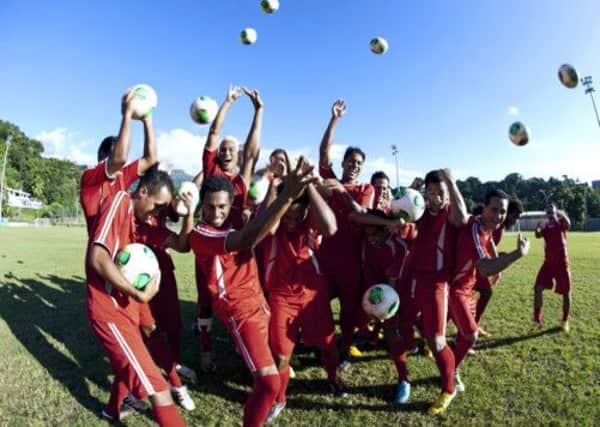Tahiti ready for Confederations Cup


Tahiti will be one of the biggest outsiders in the history of international football when they line up in the FIFA tournament that brings together the champions of its six confederations, as well as Brazil, the hosts, and Spain, winners of the last World Cup.
Tahiti’s chances of keeping the score down, never mind gleaning a point from any of their three matches, are so slim that some have questioned their right to be there, or at least the structure of a competition that doubles as a dress-rehearsal for the World Cup.
Advertisement
Hide AdAdvertisement
Hide AdThe opening match, between Brazil and Japan, is on Saturday, with Tahiti taking their bow two days later. Their inclusion comes courtesy of an unlikely victory in last year’s Oceania Cup of Nations, previously dominated by Australia – who left to join the Asian confederation in 2006 – and New Zealand. “It’s unbelievable, completely incredible,” said Eddy Etaeta, their coach, who hasn’t stop pinching himself since.
Tahiti, who represent French Polynesia, a territory in the Pacific Ocean, are ranked 135th in the world, one place behind St Kitts and Nevis and two ahead of Afghanistan. They only joined FIFA in 1990. All but one of their 23-man squad are amateur. Samuel Hnanyine is a delivery man whose duties include carrying 50kg bags of flour. Teheivarii Ludivion is a climber who specialises in work at altitude. Gilbert Meriel, one of their goalkeepers, is an auditor for KPMG, the accountancy and consulting firm. Together, they rounded off their Confederations Cup preparations with a 7-0 thrashing at the hands of Chile’s under-20 team.
And yet, here they are, preparing to play Uruguay (the Copa America winners), Nigeria (the African Cup of Nations winners) and, most mind-bogglingly of all, Spain in a revamped Maracana Stadium that is big enough to hold a third of Tahiti’s entire population. In an effort to familiarise themselves with the big-game atmosphere, they have trained alongside loudspeakers that blast out crowd noise. Their only professional player is Marama Vahirua, a 33-year-old striker. He played in Greece for Panthrakikos last season, but has spent most of his career in France. His finest hour was in 2001 when he scored the goal that won Nantes their eighth league title, an achievement he celebrated by dropping to one knee and making two strokes of an imaginary paddle. A tribute to his Polynesian origins, the ritual has since become his trademark.
Etaeta is another who wants to do the island proud, but he believes that his team have a duty to more than just their homeland. “In the history of football, we’re the first amateur footballers to participate in a big international competition,” he says. “It’s an honour to represent amateurs, who make up 99 per cent of players.”
Tahiti have exceeded all expectations with their recent progress, although a ‘but’ tends to accompany many of their achievements. Their work on youth development was rewarded with qualification for the 2009 under-20s World Cup in Egypt, but they conceded 21 unanswered goals in those finals, where their opponents included Nigeria and Spain. Their victory in last year’s Oceania Nations Cup put them through to a third and final qualifying round for the 2014 World Cup, but in a four-team group with New Zealand, New Caledonia and the Solomon Islands, they beat the latter 2-0 and lost the rest by an aggregate of 21-3.
They are not to be derided, however. In September, they will host FIFA’s Beach World Cup, which is an indication that the governing body takes them seriously. “Many people are surprised we actually play football on grass and not just on the beach for fun, but we do, and we are improving at it,” says Henri Thierry Ariiotima, the president of the Tahiti FA.
“Just being involved in the Confederations Cup really gives us the chance to improve. Having to organise the Beach World Cup for FIFA with 16 teams proves we have the capacity and potential to play a real part in world football.
“We know our limitations and we know we face very hard opponents in the Confederations Cup, but playing the world champions at the Maracana is an impossible dream that has been made real. I just hope we get our tactics right. Of course we will probably lose, but we don’t want to lose by too many goals.”
Advertisement
Hide AdAdvertisement
Hide AdTahiti’s beach soccer team are nicknamed Tiki-Toa. When their national team goes head-to-head with tiki-taka, there will be plenty at stake for both sides. Spain, still led by Vicente del Bosque, have never won the Confederations Cup. Their semi-final defeat to the United States four years ago ended a 35-match unbeaten run. If they were to go all the way this time round, it would complete a clean sweep of major trophies and serve as a reminder that, despite Germany’s success at club level, Spain’s domination of international football isn’t necessarily over.
For Brazil, the Confederations Cup is even more important, on and off the pitch. After all the usual scare stories about security and stadiums, this event will offer the clearest indication yet of how prepared they are to host next summer’s World Cup finals. How their players fare under Luiz Felipe Scolari will be similarly instructive. In the job for a second time, he has been casting the net wide, experimenting with formations and ideas, but now is the time to crystallise his thoughts. The likes of Neymar, Oscar, Lucas and Thiago Silva will be under pressure to produce the goods on home soil.
Brazil have won the last two Confederations Cups and are chasing their fourth overall but they, and indeed Spain, will be interested to note that none of the tournament’s winners has ever gone on to replicate their success in the following year’s World Cup finals. Tahiti, at least, will not have to worry about that statistic.